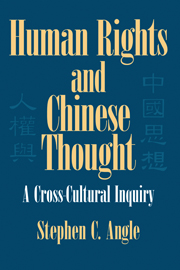Book contents
- Frontmatter
- Contents
- Preface and Acknowledgments
- Chronology
- Chapter 1 Introduction
- Chapter 2 Languages, Concepts, and Pluralism
- Chapter 3 The Consequences of Pluralism
- Chapter 4 The Shift toward Legitimate Desires in Neo-Confucianism
- Chapter 5 Nineteenth-Century Origins
- Chapter 6 Dynamism in the Early Twentieth Century
- Chapter 7 Change, Continuity, and Convergence prior to 1949
- Chapter 8 Engagement despite Distinctiveness
- Chapter 9 Conclusions
- Bibliography
- Glossary and Index
Chapter 8 - Engagement despite Distinctiveness
Published online by Cambridge University Press: 14 August 2009
- Frontmatter
- Contents
- Preface and Acknowledgments
- Chronology
- Chapter 1 Introduction
- Chapter 2 Languages, Concepts, and Pluralism
- Chapter 3 The Consequences of Pluralism
- Chapter 4 The Shift toward Legitimate Desires in Neo-Confucianism
- Chapter 5 Nineteenth-Century Origins
- Chapter 6 Dynamism in the Early Twentieth Century
- Chapter 7 Change, Continuity, and Convergence prior to 1949
- Chapter 8 Engagement despite Distinctiveness
- Chapter 9 Conclusions
- Bibliography
- Glossary and Index
Summary
RIGHTS DISCOURSE HAS CONTINUED to develop in China since the establishment of the People's Republic in 1949. As we might expect, given the ambivalent attitude that Marxism has toward rights, the developments have been neither simple nor continuous. In addition, while we have certainly seen some tensions between different ideas of rights in the pre-1949 period, contestation over who has rights, and what rights are, becomes even more prominent in the years since then. Be that as it may, most participants in Chinese rights discourse continue to conceive of rights in ways that will be familiar from earlier in the century.
This chapter has two goals. To begin with, I aim to assess the extent to which recent Chinese thinking about rights substantiates the first of Liu Huaqiu's claims, with which the book began: Do we in fact find in China today a distinctive conception of rights? Chapters leading up to this one have made clear that Chinese discussions of rights emerged and developed in a distinctive way, sharing some but not all features with developments outside China. Among other factors, concerns over the satisfaction of legitimate desires, the construction of a nation within which individuals could flourish, and the protection of individuals' abilities to develop their personalities all played important roles in the Chinese discourse.
- Type
- Chapter
- Information
- Human Rights in Chinese ThoughtA Cross-Cultural Inquiry, pp. 205 - 249Publisher: Cambridge University PressPrint publication year: 2002



